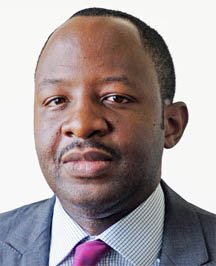Digicel hopes that legislation terminating the monopoly hold which its competitor has on the telecommunications sector will be passed during the course of this year, though the company’s Chief Executive Officer Gregory Dean says it will not set a timeline for an end to the monopoly.
“We’ll believe it when we see it,” Dean told Stabroek Business in an interview on Wednesday. Dean said that since all of the stakeholders had pronounced on the desirability of terminating the monopoly currently held by the Guyana Telephone and Telegraph Company (GT&T) he could think of no reason for any further delay in the passage of the legislation, though he conceded that “we had been there before” and still remain without a fully liberalized telecommunications sector.

Next week marks ten months since – the Jagdeo administration having aggressively pushed for an end to the GT&T monopoly -the government announced on September 22, 2011, the final day of the last sitting of the country’s ninth parliament, and without explanation that the passage of the Telecommunications Bill and the Public Utilities Amendment Bill would have to await the convening of the tenth parliament.
Since then Digicel has done little to conceal its disappointment and continues to use its public relations machinery in an effort to keep the issue of telecommunications liberalization both in the public eye and on the front burner of the parliamentary agenda.
Since the convening of the tenth parliament, the opposition political parties have publicly declared that the liberalization of the telecommunications sector was on their respective priority lists and Dean told Stabroek Business that the company had been engaged by the Alliance for Change (AFC) after that party had indicated its intention of tabling liberalization legislation in the National Assembly.
Despite what Dean admits has been a continual interlude of “frustration” for Digicel, he told Stabroek Business that the company is determined to wait out the transition to a liberalized telecommunications sector. He said the company’s greatest concern reposed in the fact that the delay in the liberalization of the sector had put a brake on some of Digicel’s plans to provide an enhanced quality of service to local consumers. Dean said the company cannot pretend to be comfortable with a situation in which several of its key post-liberalization plans including moving to ensure that customers benefit from reduced rates for international calls and utilizing the technology to ensure the provision of a wider array of services continue to be on hold.
But despite the continuing challenges which the company has had to face on account of delayed liberalization, Digicel has still been able to accomplish some of the goals which it had set itself in the period since last September. “The point is that we have had to find ways of motivating ourselves and reminding ourselves that we are still in a competitive situation and we have found ways of doing so,” Dean said.
He pointed to Digicel’s cellular build-out, which he says now covers “95-96 per cent” of the country as well as the company’s
success in bringing down call rates and handset prices and improving the quality of handsets on the local market. “I think it is fair to say that we have made a significant contribution to making the service more accessible to consumers,” Dean said.
He also paid tribute to the contribution made by the company’s technical team to the accomplishment of some of its goals in what continues to be a challenging situation.
Meanwhile, Dean told Stabroek Business that the company will be seeking to shift the focus of its corporate contributions to embrace more social causes. He said that having recently committed itself to rebuilding the Mahaica Children’s Home, Digicel may well seek to do more work in this area, perhaps identifying other similar institutions for that kind of contribution on an annual basis. Over the years both of the country’s service providers had come to be seen as generous sponsors of entertainment and sports events and Dean said that while Digicel had an enhanced interest in funding deserving social projects, this did not mean that it had lost interest in traditional sponsorship.
The fact that the company’s brand has now been fully and firmly established in Guyana means that it could now move to strike a more realistic balance between and amongst the types of events and projects for which it provides sponsorship.




